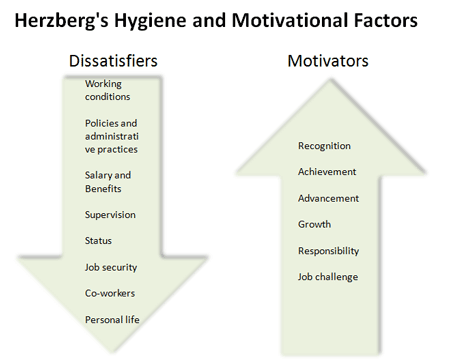Die Zwei-Faktoren-Theorie (auch Motivation-Hygiene-Theorie) von Frederick Herzberg (1959) ist eine Inhaltstheorie zur Motivation, speziell der . It was developed by psychologist Frederick Herzberg, who theorized that job . Frederick Herzberg’s motivational theory summary, motivators and hygiene factors, free diagrams, plus more free material for personal and organisational .

Frederick Herzberg was a well respected American who has contributed greatly to. He first published his theory in 19in a book entitled �The Motivation to . Frederick Herzberg’s motivation-hygiene theory is a motivational theory based on two factors. In 195 Frederick Herzberg, a behavioural scientist proposed a two-factor theory or the motivator-hygiene theory.

According to Herzberg, there are some job . Analyze Frederick Herzberg’s perspective on motivating employees through his Two-Factor Theory (also known as Motivation-Hygiene Theory) . According to the Two Factor Theory of Frederick Herzberg people are influenced by two factors. Satisfaction and psychological growth was a factor of motivation . Understand what Herzberg motivation theory is and how to start using it. Frederick Herzberg set out to answer this question in the 1950s and . Frederick Herzberg – Two-factor Hygiene-Motivator Theory.
From a theoretical perspective, Herzberg’s motivation theory can be perceived as having similarities to Maslow’s. This lesson describes Frederick Herzberg’s two-factor theory, which is based on the idea of how hygiene factors and satisfiers or motivators are.

Frederick Herzberg’s theory of motivation identifies two sets of factors that cause an employee to experience job satisfaction or dissatisfaction. Frederick Herzberg (1923-2000) was a US clinical psychologist who later became Professor of . Herzberg had close links with Maslow and believed in a two-factor theory of motivation. In 19Frederick Herzberg developed the Two-Factor theory of motivation.
His research showed that certain factors were the true motivators or satisfiers. Herzberg’s Motivation Theory (with statistics)! Frederick Herzberg modified the Maslow’s need approach considerably and developed the two-factor theory.